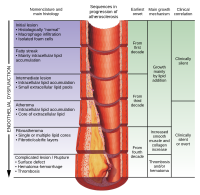
Photo from wikipedia
BACKGROUND Carotid intima-media thickness (cIMT) is a validated surrogate marker of atherosclerosis that is independently associated with the risk for cardiovascular disease. Recent studies on the effect of exercise on… Click to show full abstract
BACKGROUND Carotid intima-media thickness (cIMT) is a validated surrogate marker of atherosclerosis that is independently associated with the risk for cardiovascular disease. Recent studies on the effect of exercise on cIMT have yielded conflicting results. METHODS Studies that were available up until October 30, 2021 from the PubMed, Cochrane Library, Embase, and Web of Science databases were included in the analysis. Subgroup analyses were performed to determine the effects of the type, intensity, and duration of exercise on cIMT. RESULTS This review included 26 studies with 1370 participants. Compared with control participants, those who engaged in exercise showed a decline in cIMT (weighted mean difference [WMD] -0.02; 95% confidence interval [CI], -0.03 to -0.01; I2 = 90.1%). Participants who engaged in aerobic (WMD -0.02; 95% CI, -0.04 to -0.01; I2 = 52.7%) or resistance (WMD -0.01; 95% CI, -0.02 to -0.00; I2 = 38.5%) exercise showed lower cIMT compared with control participants. An exercise duration of >6 months was associated with a 0.02 mm reduction in cIMT. In participants with low cIMT at baseline (<0.7 mm), exercise alone was not associated with a change in cIMT (WMD -0.01; 95% CI, -0.03 to 0.00; I2 = 93.9%). CONCLUSIONS Exercise was associated with reduced cIMT in adults. Aerobic exercise is associated with a greater decline in cIMT than other forms of exercise. Large, multicenter, randomized controlled trials are required to establish optimal exercise protocols for improving the pathological process of atherosclerosis.
Journal Title: Journal of physical activity & health
Year Published: 2022
Link to full text (if available)
Share on Social Media: Sign Up to like & get
recommendations!